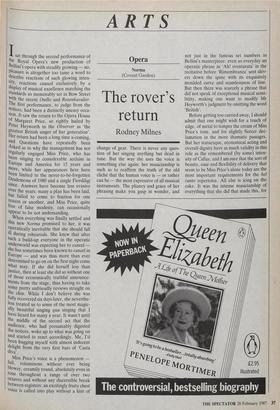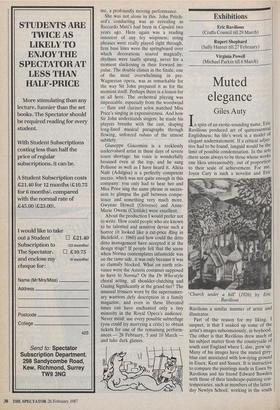ARTS
Opera
Norma (Covent Garden)
The rover's return
Rodney Milnes
Isat through the second performance of the Royal Opera's new production of Bellini's opera with steadily growing — no, pleasure is altogether too tame a word to describe reactions of such glowing inten- sity, reactions caused exclusively by a display of musical excellence matching the standards so memorably set in Bow Street With the recent Otello and Rosenkavalier. The first performance, to judge from the notices, had been a distinctly uneasy occa- sion. It saw the return to the Opera House of Margaret Price, so rightly hailed by Peter Heyworth in the Observer as 'the greatest British singer of her generation'. Her return had been a long time a-coming, and Questions have repeatedly been Asked as to why the management has not regularly engaged Miss Price, who has been singing to considerable acclaim in Europe and America for 15 years and more, while her appearances here have been limited to the never-to-be-forgotten Desdemona of 1980 and a single Fiordiligi since. Answers have become less evasive over the years: many a plan has been laid, but failed to come to fruition for one reason or another, and Miss Price, quite free of false modesty, can occasionally appear to be not undemanding. When everything was finally settled and this new Norma promised to her, it was operatically inevitable that she should fall ill during rehearsals. She knew that after such a build-up everyone in the operatic underworld was expecting her to cancel she has sometimes been known to cancel in Europe — and was thus more than ever determined to go on on the first night come What may. If she did herself less than Justice, then at least she did so without one of those economically truthful announce- ments from the stage, thus having to take some pretty unfriendly reviews straight on the chin. While I don't believe she was fully recovered six days later, she neverthe- less treated us to some of the most magic- ally beautiful singing qua singing that I have heard for many a year. It wasn't until the middle of the second act that the audience, who had presumably digested the notices, woke up to what was going on and started to react accordingly. Me, I'd been hugging myself with almost indecent delight from the very first bars of 'Casta diva'.
Miss Price's voice is a phenomenon full, voluminous without ever being blowzy, creamily round, absolutely even in tone throughout a range of over two octaves and without any discernible break between registers: an excitingly fruity chest voice is called into play without a hint of change of gear. There is never any ques- tion of her singing anything but dead in tune. But the way she uses the voice is something else again: her musicianship is such as to reaffirm the truth of the old cliché that the human voice is — or rather can be — the most expressive of all musical instruments. The pliancy and grace of her phrasing make you gasp in wonder, and not just in the famous set numbers in Bellini's masterpiece: even so everyday an operatic phrase as `Ah! sventurata' in the recitative before aimembranza' sent shiv- ers down the spine with its exquisitely moulded curve and seamlessness of line. But then there was scarcely a phrase that did not speak of exceptional musical sensi- bility, making one want to modify Mr Heyworth's judgment by omitting the word `British'.
Before getting too carried away, I should admit that one might wish for a touch of edge, of metal to temper the cream of Miss Price's tone, and for slightly fiercer dec- lamation in the more dramatic passages. But her statuesque, economical acting and overall dignity have as much validity in this role as the remembered (by some) inten- sity of Callas, and I am sure that the sort of beauty, ease and flexibility of delivery that seem to be Miss Price's alone today are the most important requirements for the bel canto repertoire. All else is icing on the cake. It was the intense musicianship of everything that she did that made this, for me, a profoundly moving performance.
She was not alone in this. John Pritch- ard's conducting was as revealing as Riccardo Muti's had been in Capuleti two years ago. Here again was a reading innocent of any fey wispiness; string phrases were really played right through, firm bass lines were the springboard over which decorations soared magically, rhythms were tautly sprung, never for a moment slackening in their forward im- pulse. The double climax in the finale, one of the most overwhelming in pre- Wagnerian opera, was as remarkable for the way Sir John prepared it as for the moment itself. Perhaps there is a lesson for us all here. The orchestral playing was impeccable, especially from the woodwind — flute and clarinet solos matched Miss Price's singing in expressiveness. And how Sir John understands singers: he made his players breathe with the cast, shaping long-lined musical paragraphs through flowing, unforced rubato of the utmost subtlety.
Giuseppe Giacomini is a recklessly undervalued artist in these days of severe tenor shortage: his voice is wonderfully bronzed even at the top, and he sang Pollione as well as I have heard it. Alicia Nafd (Adalgisa) is a perfectly competent mezzo, which was not quite enough in this company: you only had to hear her and Miss Price sing the same phrase in succes- sion to glimpse the gulf between compe- tence and something very much more. Gwynne Howell (Oroveso) and Anne- Marie Owens (Clotilde) were excellent.
About the production I would prefer not to write. How could people who are known to be talented and sensitive devise such a horror (it looked like a cut-price Ring in Bielefeld, c. 1960) and how could the ditto ditto management have accepted it at the design stage? If people felt that the scene when Norma contemplates infanticide was on the tame side, it was only because it was so clumsily blocked. What on earth rele- vance were the Asterix costumes supposed to have to Norma? Or the Dr Who-style choral acting, all shoulder-clutching and Gazing Significantly at the grand tier? The unusual trousers worn by the supernumer- ary warriors defy description in a family magazine, and even in these liberated times can have enchanted only a tiny minority in the Royal Opera's audience. Never mind: use every possible subterfuge (you could try marrying a critic) to obtain tickets for one of the remaining perform- ances — 28 February, 5 and 10 March and take dark glasses.



















































 Previous page
Previous page